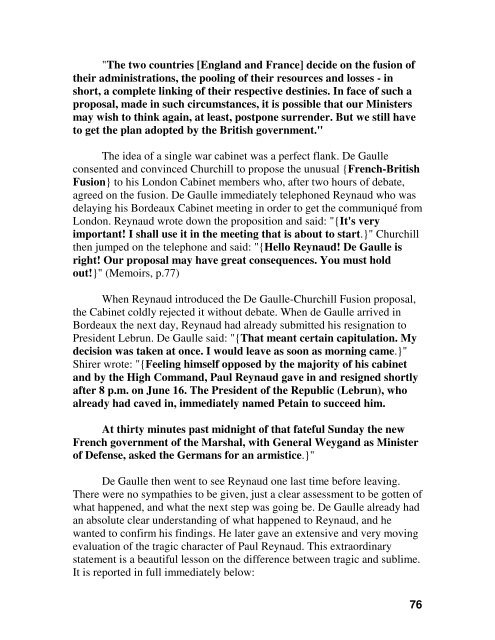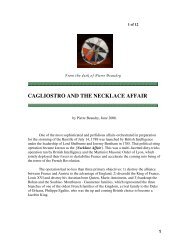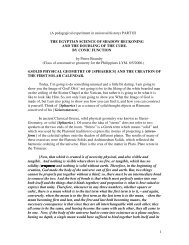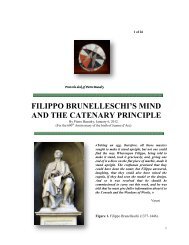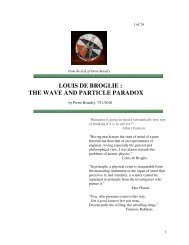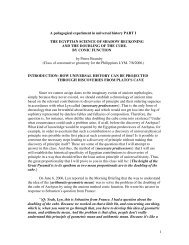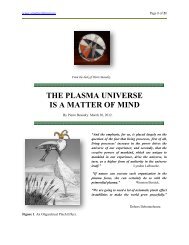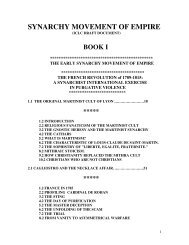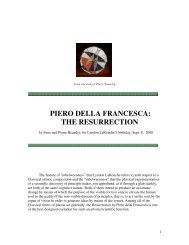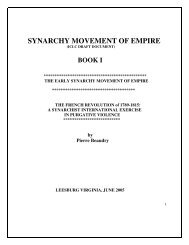synarchy movement of empire book ii - Pierre Beaudry's Galactic ...
synarchy movement of empire book ii - Pierre Beaudry's Galactic ...
synarchy movement of empire book ii - Pierre Beaudry's Galactic ...
Create successful ePaper yourself
Turn your PDF publications into a flip-book with our unique Google optimized e-Paper software.
"The two countries [England and France] decide on the fusion <strong>of</strong><br />
their administrations, the pooling <strong>of</strong> their resources and losses - in<br />
short, a complete linking <strong>of</strong> their respective destinies. In face <strong>of</strong> such a<br />
proposal, made in such circumstances, it is possible that our Ministers<br />
may wish to think again, at least, postpone surrender. But we still have<br />
to get the plan adopted by the British government."<br />
The idea <strong>of</strong> a single war cabinet was a perfect flank. De Gaulle<br />
consented and convinced Churchill to propose the unusual {French-British<br />
Fusion} to his London Cabinet members who, after two hours <strong>of</strong> debate,<br />
agreed on the fusion. De Gaulle immediately telephoned Reynaud who was<br />
delaying his Bordeaux Cabinet meeting in order to get the communiqué from<br />
London. Reynaud wrote down the proposition and said: "{It's very<br />
important! I shall use it in the meeting that is about to start.}" Churchill<br />
then jumped on the telephone and said: "{Hello Reynaud! De Gaulle is<br />
right! Our proposal may have great consequences. You must hold<br />
out!}" (Memoirs, p.77)<br />
When Reynaud introduced the De Gaulle-Churchill Fusion proposal,<br />
the Cabinet coldly rejected it without debate. When de Gaulle arrived in<br />
Bordeaux the next day, Reynaud had already submitted his resignation to<br />
President Lebrun. De Gaulle said: "{That meant certain capitulation. My<br />
decision was taken at once. I would leave as soon as morning came.}"<br />
Shirer wrote: "{Feeling himself opposed by the majority <strong>of</strong> his cabinet<br />
and by the High Command, Paul Reynaud gave in and resigned shortly<br />
after 8 p.m. on June 16. The President <strong>of</strong> the Republic (Lebrun), who<br />
already had caved in, immediately named Petain to succeed him.<br />
At thirty minutes past midnight <strong>of</strong> that fateful Sunday the new<br />
French government <strong>of</strong> the Marshal, with General Weygand as Minister<br />
<strong>of</strong> Defense, asked the Germans for an armistice.}"<br />
De Gaulle then went to see Reynaud one last time before leaving.<br />
There were no sympathies to be given, just a clear assessment to be gotten <strong>of</strong><br />
what happened, and what the next step was going be. De Gaulle already had<br />
an absolute clear understanding <strong>of</strong> what happened to Reynaud, and he<br />
wanted to confirm his findings. He later gave an extensive and very moving<br />
evaluation <strong>of</strong> the tragic character <strong>of</strong> Paul Reynaud. This extraordinary<br />
statement is a beautiful lesson on the difference between tragic and sublime.<br />
It is reported in full immediately below:<br />
76


